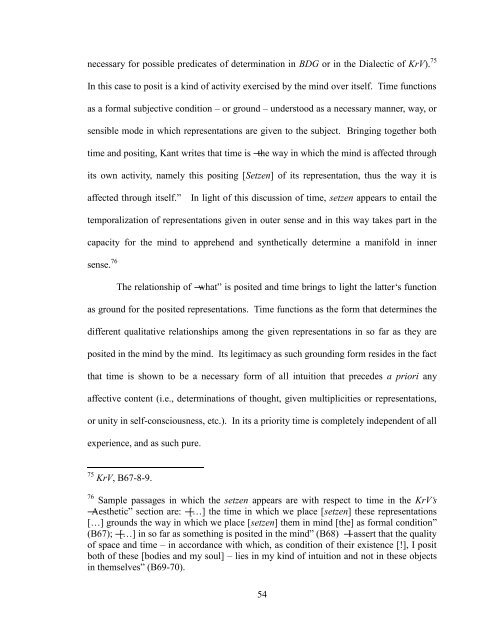The Doctrine of Self-positing and Receptivity in Kant's Late ...
The Doctrine of Self-positing and Receptivity in Kant's Late ...
The Doctrine of Self-positing and Receptivity in Kant's Late ...
You also want an ePaper? Increase the reach of your titles
YUMPU automatically turns print PDFs into web optimized ePapers that Google loves.
necessary for possible predicates <strong>of</strong> determ<strong>in</strong>ation <strong>in</strong> BDG or <strong>in</strong> the Dialectic <strong>of</strong> KrV). 75<br />
In this case to posit is a k<strong>in</strong>d <strong>of</strong> activity exercised by the m<strong>in</strong>d over itself. Time functions<br />
as a formal subjective condition – or ground – understood as a necessary manner, way, or<br />
sensible mode <strong>in</strong> which representations are given to the subject. Br<strong>in</strong>g<strong>in</strong>g together both<br />
time <strong>and</strong> <strong>posit<strong>in</strong>g</strong>, Kant writes that time is ―the way <strong>in</strong> which the m<strong>in</strong>d is affected through<br />
its own activity, namely this <strong>posit<strong>in</strong>g</strong> [Setzen] <strong>of</strong> its representation, thus the way it is<br />
affected through itself.‖ In light <strong>of</strong> this discussion <strong>of</strong> time, setzen appears to entail the<br />
temporalization <strong>of</strong> representations given <strong>in</strong> outer sense <strong>and</strong> <strong>in</strong> this way takes part <strong>in</strong> the<br />
capacity for the m<strong>in</strong>d to apprehend <strong>and</strong> synthetically determ<strong>in</strong>e a manifold <strong>in</strong> <strong>in</strong>ner<br />
sense. 76<br />
<strong>The</strong> relationship <strong>of</strong> ―what‖ is posited <strong>and</strong> time br<strong>in</strong>gs to light the latter‘s function<br />
as ground for the posited representations. Time functions as the form that determ<strong>in</strong>es the<br />
different qualitative relationships among the given representations <strong>in</strong> so far as they are<br />
posited <strong>in</strong> the m<strong>in</strong>d by the m<strong>in</strong>d. Its legitimacy as such ground<strong>in</strong>g form resides <strong>in</strong> the fact<br />
that time is shown to be a necessary form <strong>of</strong> all <strong>in</strong>tuition that precedes a priori any<br />
affective content (i.e., determ<strong>in</strong>ations <strong>of</strong> thought, given multiplicities or representations,<br />
or unity <strong>in</strong> self-consciousness, etc.). In its a priority time is completely <strong>in</strong>dependent <strong>of</strong> all<br />
experience, <strong>and</strong> as such pure.<br />
75 KrV, B67-8-9.<br />
76 Sample passages <strong>in</strong> which the setzen appears are with respect to time <strong>in</strong> the KrV‘s<br />
―Aesthetic‖ section are: ―[…] the time <strong>in</strong> which we place [setzen] these representations<br />
[…] grounds the way <strong>in</strong> which we place [setzen] them <strong>in</strong> m<strong>in</strong>d [the] as formal condition‖<br />
(B67); ―[…] <strong>in</strong> so far as someth<strong>in</strong>g is posited <strong>in</strong> the m<strong>in</strong>d‖ (B68) ―I assert that the quality<br />
<strong>of</strong> space <strong>and</strong> time – <strong>in</strong> accordance with which, as condition <strong>of</strong> their existence [!], I posit<br />
both <strong>of</strong> these [bodies <strong>and</strong> my soul] – lies <strong>in</strong> my k<strong>in</strong>d <strong>of</strong> <strong>in</strong>tuition <strong>and</strong> not <strong>in</strong> these objects<br />
<strong>in</strong> themselves‖ (B69-70).<br />
54


